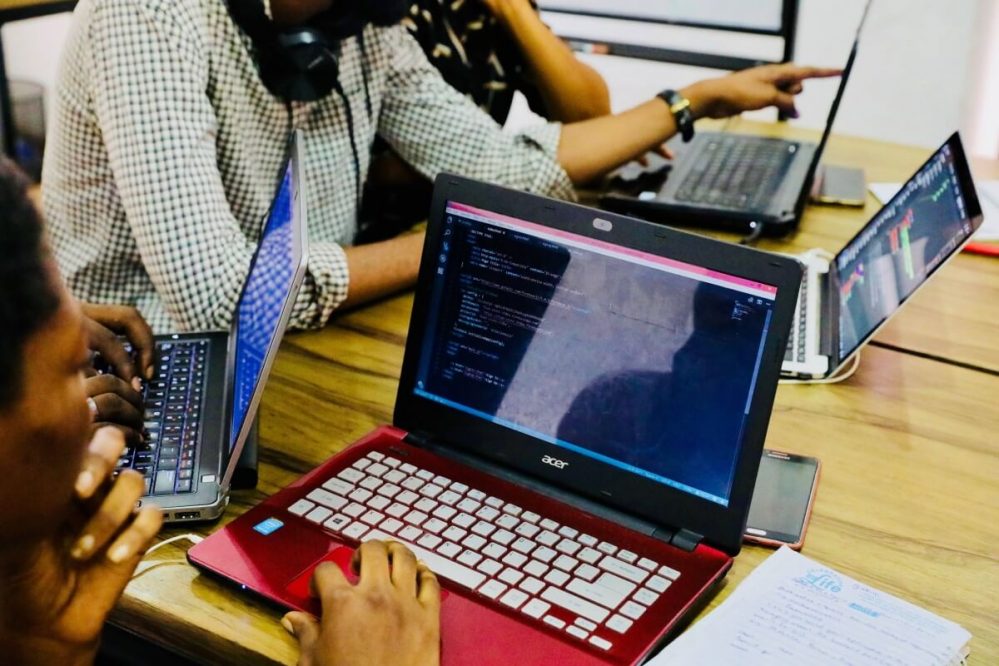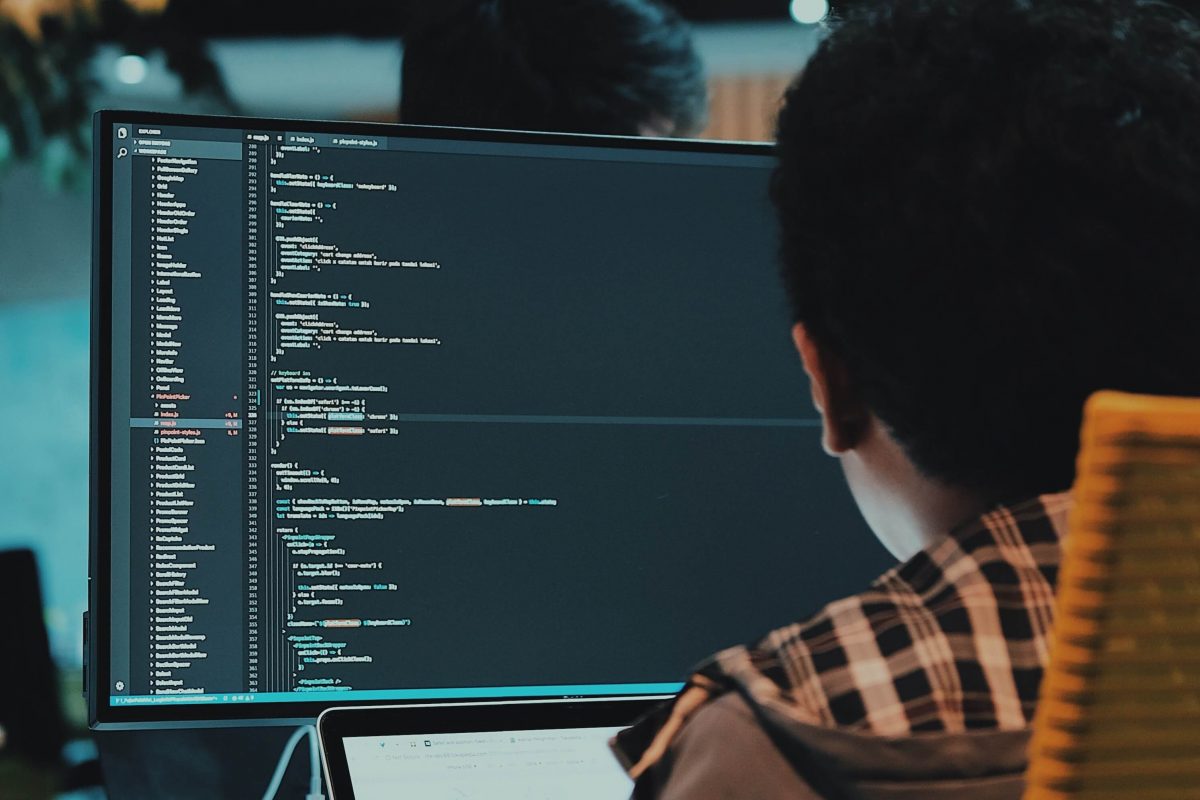Key Takeaways
- Coding is a universal skill that benefits not just tech professionals but people in virtually all industries.
- Coding boosts career opportunities and income, with coding jobs offering higher-than-average salaries.
- Learning to code enhances problem-solving, creativity, and independence in the digital world.
- Coding is accessible to everyone, regardless of age, background, or academic major.
- You can apply coding in real-world fields like web development, AI, cybersecurity, and more.
We can easily say that it’s almost impossible for you not to have heard about coding (mind us, there are always exceptions), seeing how its popularity has significantly increased in the last few years. Coding is being considered the language of the modern world as thanks to coding, people can communicate instructions to the devices and guide them on how to operate.
We know you don’t doubt the importance of coding. However, students of a major not related to computer science or IT might not be entirely sold on the idea of coding bringing benefits to them. Well, let us tell you that you don’t have to necessarily be a computer science major to leverage the upsides of coding. Keep on reading to find out the answer to the question: “Why is coding important?”.
Why Is Coding Important?
In this digital economy, coding is the foundation of almost everything we interact with, from the websites we browse and the apps we rely on to the AI tools and automated systems that run behind the scenes. It’s the language that powers our digital world, enabling businesses to operate efficiently, connect with customers, and adapt to constant change.
Understanding why coding is important starts with recognizing how deeply it’s embedded in our daily lives. Every swipe on a smartphone, every online purchase, and every social media post —none of it would be possible without code. And beyond consumer technology, coding is what drives innovation in healthcare, education, transportation, and nearly every other industry.
Ultimately, learning to code is a form of personal empowerment. It gives you the tools to build things, automate tasks, and understand the technology shaping our future. Whether you’re aiming to start a business, join a tech company, or simply explore new creative outlets, that’s why coding is important; it gives you the power to create, innovate, and stay ahead in a digital-first world.
Benefits of Coding
Coding offers more than just technical know-how; it’s a skill that can reshape how you approach challenges, communicate ideas, and navigate our digital-first world. Its impact reaches far beyond the screen.
In the sections that follow, you’ll discover how coding can open up new possibilities, both professionally and personally, and why it’s becoming an essential skill for the future.
1. Qualify for in-demand coding jobs
Knowing how to code significantly boosts your chances of landing a job in one of the most in-demand and rapidly growing sectors. From startups to multinational corporations, employers are searching for individuals who can build, maintain, and improve their software infrastructure and automation tools.
But it’s not just the traditional tech sector that needs these skills. Industries like healthcare, education, transportation, and even law are now tech-driven, relying on programmers to create innovative solutions to complex problems. With coding in your skill set, you become a candidate who can adapt to changing technologies, step into interdisciplinary roles, and contribute to diverse teams, all of which make you more competitive in the eyes of hiring managers across the board.
2. Build a strong portfolio
We already know that each year, the job market becomes more and more competitive. So, for a job candidate to get a certain position among hundreds of others, they have to show that they are the ones that they deserve it. How do they do it? Well, you start by creating a CV or a portfolio that not too many people have.
In the journey towards mastering coding skills, one tries multiple things in order to practice what they’re learning. You can easily add these little “projects” to your resume and showcase the work you’ve done over the months (even over the years). Through these projects, you show the employer that you have the knowledge and the technical skills that a candidate needs to work in a coding job environment.
3. Work in any industry
One of the most liberating aspects of learning to code is realizing how universal and transferable the skills are. You’re not tied down to one specific career path, and you’re not forced to choose between passion and practicality. If you love the arts, you can build tools for musicians or apps for photographers. If healthcare fascinates you, there are opportunities in medical tech, health data analysis, and telemedicine platforms.
Even industries that don’t appear tech-heavy at first glance, like agriculture, construction, or non-profits, are increasingly relying on software to optimize operations, collect data, or increase reach. This means that with coding, you can align your technical work with personal values, interests, or causes, which creates a stronger sense of fulfillment in your career.
4. Increase your earning potential
At the end of the day, the financial aspect is one of the primary reasons why many people get up in the morning and go to work. We all have financial responsibilities that need to be taken care of, which would be impossible to do if we didn’t get a paycheck at the end of the month. Many careers offer some of the highest salaries, and coding is one of them.
According to the U.S. Bureau of Labor Statistics (BLS), professionals in the coding industry continue to command competitive salaries, reflecting the high demand for their skills. As of the latest data, the median annual wage for software developers was $131,450. Computer network architects had a median annual wage of $130,390, while computer programmers earned a median of $98,670. Web developers reported a median annual wage of $95,380.
These figures are significantly higher than the median annual wage for all occupations, which stood at $49,500 in May 2024.

5. Sharpen problem-solving skills
In the words of the pioneer of the personal computer era, Steve Jobs: “Everybody in this country should learn how to program a computer, should learn a computer language, because it teaches you how to think. It’s like going to law school. I don’t think anybody should be a lawyer, but going to law school can actually be useful because it teaches you how to think in a certain way… I view computer science as a liberal art.”
To put it another way, learning to code gives you not only the technical skills, but it also gives you another perspective through which you approach work and see the world. You learn to look at things logically. Not to mention that you become a detail-oriented person, as one little mistake of a missing hyphen can ruin your entire code.
6. Boost your creativity
It might seem counterintuitive to call coding a creative skill, but it absolutely is. Just like a writer crafts a story or a designer builds an experience, a coder constructs digital worlds from scratch. Whether you’re creating a sleek user interface, building a new feature into a web app, or inventing a novel use for an existing API, coding constantly challenges you to think imaginatively.
Coding encourages experimentation, and through this, you gain the freedom to play, innovate, and express your ideas in a form that others can interact with.
7. Fuel your curiosity
Curiosity is something unique to our species. Among the activities that awaken our interest is coding. In coding, one has to experiment with different patterns to see where that leads them. This process allows people to ask themselves questions, ‘’What if I do this, will it be better?’’, ‘’What happens when I add this hyphen?’’ and others of this kind. Simultaneously, by experimenting with patterns, you can increase your self-confidence and become more resilient and creative than you’ve been.
8. Gain technological independence
We’ve all been there, not being able to navigate in the digital area on our own and waiting with our hands crossed until an expert in this field comes to the rescue. Imagine not having to wait for anyone, but instead, we deal with the messes we make online on our own. While this can, at times, seem impossible, it is totally doable. Here, coding skills come in handy. Depending on the job you do, knowing a particular coding language can be your best friend.
Even though teamwork is positively encouraged, sometimes too much time is spent waiting for people to do what they’re supposed to do. So, a little individuality can’t hurt. The less you’re dependent on others, the better for you.
9. Enjoy more freedom and flexibility
One other good thing about having coding skills is that you get to land jobs that offer the flexibility of working remotely. You aren’t bound to the office from 9 to 5. Instead, you get to work on your schedule at your home or wherever you feel like working. You can even travel the world while working; all you need to take with you is a computer and an internet connection (which, frankly, can be found almost everywhere).

10. Future-proof your career
Technology is the future. As automation and AI take over more routine tasks, the ability to understand and create technology becomes increasingly important. Coding gives you a foothold in this future, allowing you to not just survive but thrive as the job market continues to evolve.
Interested in pursuing a degree?
Fill out the form and get all admission information you need regarding your chosen program.
This will only take a moment.
Message Received!
Thank you for reaching out to us. We will review your message and get right back to you within 24 hours.
If there is an urgent matter and you need to speak to someone immediately you can call at the following phone number:
- We value your privacy.
And because coding is foundational to so many emerging fields, having that base knowledge allows you to pivot into new roles as industries shift. Even if your job title changes, your coding skills remain relevant and valuable, keeping you adaptable in a rapidly changing world.
11. Launch personal projects
One of the most fulfilling things about knowing how to code is the ability to bring your own ideas to life. You don’t have to wait for funding, permission, or a team. You can build a prototype in your free time, test your concept, and iterate based on what you learn. This ability to create opens the door to entrepreneurship. Many successful businesses started as side projects by someone who just wanted to solve a problem they cared about. Whether or not you turn your project into a full-fledged company, the process of building something for yourself is immensely rewarding and provides a constant sense of progress and ownership over your work.
12. Join a global community
When you learn to code, you’re entering a worldwide network of developers, designers, engineers, and learners who share their knowledge freely. From online forums and open-source communities to local meetups and global hackathons, the coding world thrives on collaboration and mentorship. You’re never really alone in your learning journey; there’s always someone out there willing to help debug your code, review your pull request, or point you to a better solution. This sense of community reminds you that you’re part of something larger than yourself, a shared effort to build the tools that shape our world.

Real-World Applications of Coding
From the apps on our phones to the security systems that protect our data, coding serves as the invisible backbone behind much of modern life. Whether you realize it or not, the ability to write and understand code is already changing the present in countless powerful ways.
Here are some real-world applications of coding that are driving innovation today:
- Web Development – Coding is essential in creating websites and web-based applications. Whether it’s a simple personal blog or a complex platform like Google Docs, web developers use languages like HTML, CSS, JavaScript, and backend technologies to build functional, visually appealing, and responsive digital spaces.
- Mobile Apps – Every mobile app, from ride-sharing platforms like Uber to fitness trackers and banking apps, relies on code to function. Developers use languages like Swift (for iOS) and Kotlin or Java (for Android) to design and maintain applications that are fast, interactive, and easy to use.
- Artificial Intelligence (AI) – AI applications, such as virtual assistants, recommendation algorithms, and self-driving cars, depend heavily on coding to process large datasets, recognize patterns, and make intelligent decisions. Python is one of the most widely used languages in this field, thanks to its powerful libraries like TensorFlow and PyTorch.
- Video Games – Coding is the core of video game development, from designing characters and gameplay mechanics to rendering graphics and managing in-game physics. Languages like C++, C#, and scripting within engines like Unity and Unreal are used to bring immersive gaming experiences to life.
- E-commerce Platforms – Online stores like Amazon, Shopify, and Etsy rely on code to manage everything from product listings and shopping carts to payment systems and user accounts. Developers ensure these platforms run smoothly, remain secure, and offer a seamless experience for customers worldwide.
- Cybersecurity Systems – In an era of increasing cyber threats, coding is critical in developing tools that detect, prevent, and respond to attacks. Security professionals use code to write firewalls, intrusion detection systems, and encryption protocols that protect sensitive data across networks and devices.
How Long Does It Take to Learn Coding?
The time it takes to learn coding depends on what level of proficiency you’re aiming for. If your goal is to develop a basic understanding, such as writing simple programs, understanding logic, and getting comfortable with syntax, it can take 1 to 3 months with consistent effort. Many people start here by learning languages like Python or JavaScript through self-paced online courses, coding apps, or YouTube tutorials. At this stage, you’ll be able to build small projects, automate simple tasks, and start thinking like a programmer. A background in math or logical thinking can help speed things up, but it’s not a strict requirement—curiosity and persistence often matter more.
Reaching job-ready proficiency, however, typically takes 6 months to 2 years, depending on your learning path and how much time you dedicate. Coding boot camps, which are intensive programs lasting 3 to 6 months, can prepare you for junior-level developer roles quickly if you commit full-time. Self-taught learners might take longer due to the need to structure their own curriculum and find support, while those pursuing a computer science degree usually spend 3 to 4 years but gain a broader foundation. Factors like your daily time investment, problem-solving ability, and access to real-world projects or mentorship will all influence how fast you reach a level where you can confidently apply for jobs or freelance work.
Conclusion
Learning to code can positively affect you in all aspects of your life. What’s best, it gives you a renowned perspective to approach life from a different light. Coding is a skill just like any other. The more proficient you become in it, the better you’ll feel about yourself. We believe that all other coding benefits will come second to the feeling you’ll experience after you master this skill. How you’re going to learn it is irrelevant as long as you’re committed to it. You can learn it yourself, register in a boot camp, or enroll in a computer science or IT program.
The University of the Potomac offers both of these programs on all its campuses. So, you have the freedom to choose your study location. Contact us for more information. Happy coding!
Frequently Asked Questions
Is learning to code only beneficial for computer science or IT majors?
Not at all. Coding skills have become valuable across various industries. While it’s beneficial for tech-related careers, coding enhances problem-solving, logical thinking, and creativity, which are applicable in diverse fields like finance, healthcare, and even the arts.
Are there any age restrictions or limitations to learning to code?
No, coding has no age barriers. People of all ages can learn and benefit from coding. Many resources cater to beginners and advanced learners alike, allowing anyone interested to start learning regardless of age.
Does coding require math?
Math helps in certain areas, but it’s not a requirement for most coding work. You can absolutely start coding without being a math whiz.










